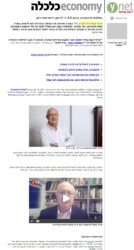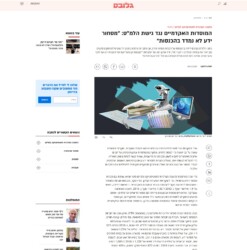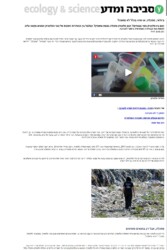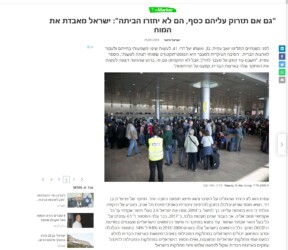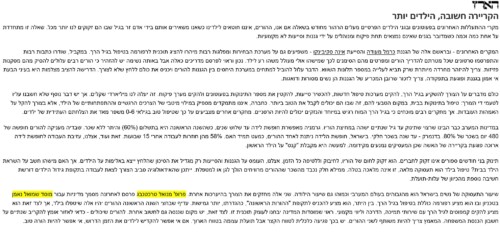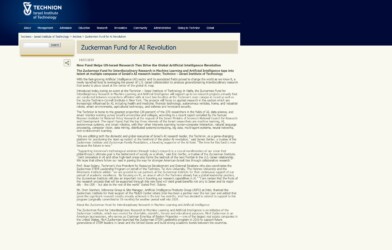Connect to schedule an interview
+972.4.829.2329
Neaman in the media
“”Maternity leave” for Fathers
Manuel Trajtenberg, Ron Leyzer NULL
The percentage of those fathers who take advantage of maternity leave in Israel is among the lowest in the OECD; only 1% of fathers exercise their privilege. According to Prof. Manuel Trajtenberg’s proposal, rather than extend maternity leave for mothers, men will be required to take at least two weeks of maternity leave, and the total number of weeks on paid leave for both sexes together will total 24 weeks rather than 15 weeks as is the case today.
On the FM 103 radio program of Yinon Magal and Ben Caspit, Ron Leyzer, a Samuel Neaman Institute researcher on gender economics, was interviewed. Leyzer explained the motivation behind this initiative: “Today, women are compelled to take maternity leave”. According to Leyzer, the Israeli model lags behind the rest of the world and works against the best interests of the infant, the parents and the economy.
This research was done at the S. Neaman Institute. The Israeli model in force today lags behind the rest of the world. It is narrow, inflexible and does not place the wellbeing of the infant or the economy at its core. Expanding the various possibilities for the parents means that if the mother desires to remain at home for 15 weeks, she can do that even after the proposed reform. The most important change proposed is to require fathers to take two weeks of leave.
“There are several reasons for this. The idea is for the father’s maternity leave to occur right at the onset of the reform, in order to change the social norm of fathers and employers — fathers may want to take maternity leave but face employers’ opposition.”
Trajtenberg’s recommendations V 2.0 – calling for a new fiscal policy
Manuel Trajtenberg
Prof. Manuel Trajtenberg, Chair of the Committee that brought an end to the social protests eight years ago, is deeply worried. Less about the budget deficit, than about the current process. For the next government, when it is formed, he recommends abandoning the budgetary expenditure principle, in favor of a multi-year program; to raise the tax on value added, and mainly, to make strenuous efforts to restore public trust in government.
“Israel is in the midst of a time in which budgetary policy has been fixed, unchanged, and for years has been dogmatic and obsolete. If the next government fails to change this policy, then we face a serious crisis.” Thus, in sharp words that are in stark contrast to his normally sedate character, Prof. Trajtenberg warns of the coming storm.
The government is having an affair with the industrialists – leaving consumers behind
Tsipy Buchnik, Daphne Getz, Ilia Zatcovetsky
Many economists have already called the government to amend the law to encourage capital investment, which primarily encourages industry and exports. The Bank of Israel is now proposing a reform that will replace export benefits with more balanced support for the economy.
Academic Institutions Against CBS Approach: “Commercialization of Knowledge Not Measured in Revenue”
Arnon Bentur, Moshe Sidi
The “third goal” of the Academy – the transfer of academic knowledge to industry and society.
Although there are successful and well-known cases such as those of Mobilai, whose activities evolved from image processing technology developed by Prof. Amnon Sheshua, one of the company’s founders, in his academic research. Another example is Copaxone, a multiple sclerosis drug developed at the Weizmann Institute, which is responsible for a significant portion of Teva’s revenue. Nevertheless, a report from the Samuel Neaman Institute published in the Globes suggested a policy change that defines the goals of the commercial departments – from financial goals to knowledge dissemination to society and industry.
An interview with Noam Salinger about industrial symbiosis
Noam Salinger of S4 is leading the Northern Industrial Symbiosis program was hosted in a radio show. The Industrial Symbiosis Program is a program in collaboration with the Ministry of Economy, which builds collaborations between factories, businesses, industrial zones, agriculture, and organizations – when waste from one business becomes a profitable raw material for another business. Dr. Gilead Fortuna and Prof. Ofira Ayalon serve as professional consultants for the project.
link :Interviewlink
Biological, biodegradable, or doesn’t it matter at all?
In light of the growing awareness to the problem of plastics in the environment, the subject of alternatives to conventional plastic arise. “The intuition about the behavior of materials in a changing environment is irrelevant. The composition of the materials has to be very well understood, every material behaves differently,” says Prof. Ofira Ayalon, head of environment cluster at the Samuel Neaman Institute and the Department of Natural Resources and Environmental management at the University of Haifa.
No clean plate: that’s how global food waste has become a ticking bomb
Food waste has an enormous impact on the environment, mainly due to greenhouse gases emissions. Prof. Ofira Ayalon of the University of Haifa and the Samuel Neaman Institute, a senior researcher in the fields of environmental,
sustainability and economics, realized in her research that there is great uncertainty regarding the extent of household food waste due to the different measurement methods, and together with Efrat Elimelech, in her PhD thesis, tried to conduct a waste survey among 200 families of the socio-economic strata 7-8 in Haifa. The results were published in 3 academic papers.
Brain gain it is not just the money
Manuel Trajtenberg
Several programs implemented in recent years have tried to bring back the fleeing minds to Israel. Aside from the tax relief provided by returning residents, there have also been attempts to change the budget of the universities so that young researchers can be employed.
“There is one very significant statistic: the senior faculty at universities,” says Prof. Manuel Trajtenberg of Tel Aviv University and the Samuel Neaman Institute at the Technion, who served as chair of the Planning and Budgeting Committee of the Council for Higher Education until 2014.
“In 2000-2009, there was a significant decline in senior faculty members, And since 2010 the trend is reversed and an increase in numbers has begun again. “
Career matters the kids even more
Manuel Trajtenberg
The employment rate of women in Israel is among the highest in the Western world, as is the birth rate.
These two reinforce the need for a different preparation. Prof. Manuel Trajtenberg recently published a policy document for the Samuel Neaman Institute at the Technion offering comprehensive reform in early childhood care.
Among other things, it suggests introducing more flexibility into the “first parenting” period. It is preferable that in the first half of the year parents be the ones to care for the child, but at the same time he offers to set up early childhood campuses with support services, guidance and professional guidance.
Zuckerman Fund for AI Revolution
Ella Barzani, Daphne Getz, Eran Leck, Sima Tziperfal, Avida Shoham, Roey Tzezana, Shlomo Rosenberg
The Technion is home to the greatest proportion (28 percent) of the 270 researchers in the fields of AI, data science, and smart robotics working across Israel’s universities and colleges, according to a recent report compiled by the Samuel Neaman Institute for National Policy Research at the request of the Israeli Ministry of Science’s National Council for Research and Development.
The report found that the top three interests of the Israeli researchers are machine learning, AI, autonomous systems, and smart robotics, with their other interests spanning human-computer interaction, natural language processing, computer vision, data mining, distributed systems/computing, big data, multi-agent systems, neural networks, and reinforcement learning.


